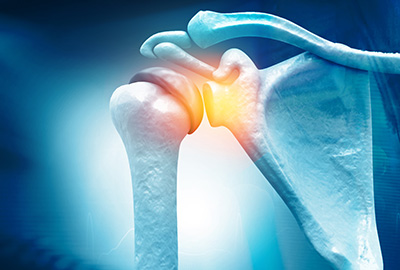
At the Center for Sports & Regenerative Orthopedics in Waldorf, MD, Rotator Cuff injury can be addressed with a variety of treatment choices that have proved successful with our patients. Contact us online or call (240) 754-7954 to schedule a consultation today with one of our Rotator Cuff specialists on Post Office Road near Post Office Lake in Waldorf, Maryland.
We are located in the St. Charles community of Waldorf, with its walking paths, swimming pools, scenic lakes, playgrounds and neighborhood centers. If you’re traveling in from out of town, we are conveniently located near an array of fine hotels and unique dining experiences.
The Rotator Cuff is made up of a group of four tendons that form a covering around the head of the humerus. This group of tendons connects your shoulder blade to your humerus, and it is critical in helping lift and rotate your upper arm. The Rotator Cuff is designed to hold your arm in your shoulder socket, as it allows you to reach upward and lift your arm.
Because of the involvement of your shoulder, Rotator Cuff injury is often understood by patients as a shoulder injury, and so they seek out a shoulder doctor or shoulder specialist. Our specialists in regenerative orthopedics are Rotator Cuff specialists, specifically trained and experienced in Rotator Cuff tear treatment – as well as shoulder issues and whole body care.
Injury to the Rotator Cuff usually involves a torn tendon, so you often hear it referred to as a Rotator Cuff tear. Most of these tears occur in people who are in middle age or older and are usually the result of a wearing down of the Rotator Cuff tendons. Damage occurs cumulatively and slowly over time, and this degeneration occurs naturally as you age. In most cases, this process of degenerative damage can be relatively painless, and you might not see the seemingly “sudden” tear coming.
When one or more of your four Rotator Cuff tendons is torn, the torn tendon can become partially or completely detached from the head of your humerus. Injuries of this type, especially when detachment occurs, can be extremely painful and debilitating.
Your Rotator Cuff can be damaged in several ways – ranging from a sudden injury to wear-and-tear deterioration over time. Sometimes even lack of blood supply to the Rotator Cuff – which happens as you age – can eventually cause degenerative damage.
People who are younger usually only experience Rotator Cuff tears from a major injury – like a fall for instance, which will result in sudden intense pain. You may even hear an audible snapping sensation followed by immediate weakness in the upper part of the arm that is affected.
As people begin to age, however, work-related repetitive movement (carpenters, painters, etc.) and even routine chores or hobbies can contribute to the development of Rotator Cuff deterioration – especially if overhead work is involved. Damage, deterioration and injury also can occur over time from athletic activities like rowing, weightlifting, baseball or tennis.
Pain is the most common symptom, and it can come on suddenly or gradually. While pain and weakness are the two primary symptoms, other symptoms may include:
A thorough medical history is our first step, which will include questions about any activities that may have led to your condition. We then perform a physical exam to check for pain, swelling or stiffness in the area of your Rotator Cuff.
Generally, ultrasound is our preferred imaging test for diagnosis because it allows us to visualize the tendon and surrounding structures and allows us to make an accurate assessment on the severity of your injury or damage and what caused it. Having it done the same day as your first visit helps us start your treatment protocol immediately.
After the ultrasound exam and diagnosis, we typically offer physical therapy and exercises to improve body mechanics. We utilize Dry Needling and Trigger Point Injections when necessary to stimulate circulation, improve mobility, and significantly reduce pain in the targeted area. Increasing blood flow to the shoulder can help reduce the inflammation in the torn rotator cuff.
If these methods do not help, we may try other methods – cutting-edge alternative treatments like Platelet Rich Plasma (PRP) are quite popular. Research has shown that PRP is highly effective for treating rotator cuff tears, without the risk or expense of surgery. Smaller tears can respond well to treatments like prolotherapy.
There are also conventional treatment methods for Rotator Cuff injury that include:
At the Center for Sports & Regenerative Orthopedics in Waldorf MD, our specialized Rotator Cuff doctors always prioritize our patients’ preferences, and ultimately, we present your options, and you make the choice. Oftentimes, we see athletes or patients who are very active or whose jobs or lifestyles require the problem resolved immediately, and we move right into the more in-depth techniques like PRP or prolotherapy aiming for fast results. We also have patients who prefer simpler methods, and in those cases, we can take treatment steps one at a time to see what works, trying conservative steps with therapy which can provide strength, stability, and pain relief, but may take more time.
All our treatment methods have an excellent track record and have brought impressive results for our patients in the Waldorf MD area. For more questions about our treatment methods, speak with our experts today to see which might be the best treatment option for you.
At the Center for Sports and Regenerative Orthopedics in Waldorf, MD, our goal is to help you reach higher than ever before.
If you are ready to get back to the life you love, take the next step towards diagnosing and addressing your condition. Call (240) 754-7954 or contact us online to set up a consultation with our Rotator Cuff specialists!
Center for Sports and Regenerative Orthopedics
601 Post Office Road, Suite 2A
Waldorf,
MD 20602
Phone: (240) 754-7954
Get Directions